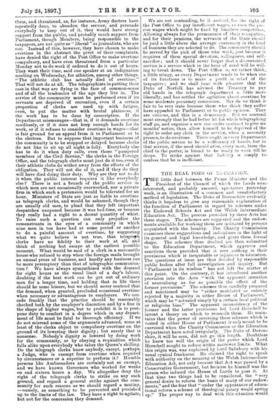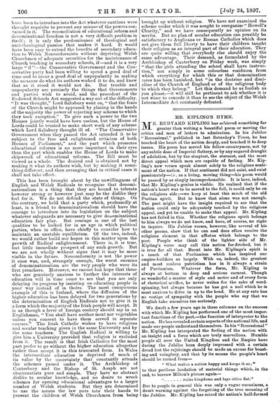THE REAL FOES OF EIUCATION. T HE little duel between the
Prime Minister and the President of the Council of which the Lords were- interested, and probably amused, spectators yesterday week, is an illustration of a common and unsatisfactory method of legislation. The Duke of Devonshire evidently thinks it hopeless to give any reasonable explanation of the function of Parliament in regard to schemes under the Endowed Schools Act and the Welsh Intermediate Education Act. The process provided by these Acts has three stages. The schemes are suggested and the endow- ments available for working them are indicated by persons acquainted with the locality. The Charity Commission examines these suggestions and indications in the light of its general and legal knowledge, and gives them formal shape. The schemes thus drafted are then submitted to the Education Department, which approves and sanctions them provided that it sees nothing in their provisions which is inequitable or injurious to education. The questions at issue are thus decided by responsible' public bodies after full investigation and inquiry. But "Parliament in its wisdom" has not left the matter at this point. On the contrary, it has introduced another provision into the Acts "with the apparent intention of neutralising as far as possible the effect of the former provisions." The schemes thus carefully prepared and sanctioned may be "either mutilated or entirely rejected by a majority in either House of Parliament," which may be "actuated simply by a certain local political or religious bias." The apparent inconsistency of the former and the latter provisions led Lord Herschell to invent a theory on which to reconcile them. He main- tains that the power of reversing these schemes which is. vested in either House of Parliament is only meant to be exercised when the Charity Commission or the Education Department have acted irregularly. The Duke of Devon- shire, it will be seen, did not go this length. Doubtless he knew too well the origin of the power which Lord Hersehell sought to reduce within narrower limits. What this origin was, was explained by Lord Salisbury with his usual cynical frankness. He claimed the right to speak with authority on the meaning of the Welsh Intermediate Education Act, not only because that Act was passed by a Conservative Government, but because he himself was the person who induced the House of Lords to pass it. At that time two things had to be considered, the "very general desire to reform the basis of many of our endow- ments," and the fear that "under the appearance of educa- tional reform a scheme of theological piracy would spring up." The proper way to deal with this situation would have been to introduce into the Act whatever cautions were thought requisite to prevent any misuse of the powers con- tat ned in it. The reconciliation of educational reform and denominational freedom is not a very difficult problem in itself ; it is only the predominance of theological and anti-theological passion that makes it hard. It would have been easy to extend the benefits of secondary educa- tion to Welsh Nonconformists without depriving Welsh Churchmen of adequate securities for the maintenance of Church teaching in secondary schools, if—and it is a very large "if "—the Conservative Government and the Con- servative party had been willing to spend a good deal of time and to incur a good deal of unpopularity in making the measure do what its authors wished it to do, and knew that as it stood it would not do. But trouble and unpopularity are precisely the things that Governments and parties wish to avoid, and the precedent of the Endowed Schools Act suggested a way out of the difficulty. "It was thought," Lord Salisbury went on, "that the fears of the Church might be appeased by placing in the hands of the majority the power of rejecting any scheme to which they took exception." To give such a power to the two Houses jointly would have been useless, but the House of Lords could be trusted to make short work of any scheme which Lord Salisbury thought ill of. "The Conservative Government when they passed the Act intended it to be subject to the free and enlightened criticism of both Houses of Parliament," and the part which promotes educational reforms is no more important in their eyes than the part which enables the House of Lords to make shipwreck of educational reforms. The Bill must be viewed as a whole. The desired end is obtained not by making it what its authors wish, but by making it some- thing different, and then arranging that in critical cases it shall not take effect.
This has been brought about by the unwillingness of English and Welsh Radicals to recognise that denomi- nationalism is a thing that they are bound to tolerate however strong or however just may be the dislike they feel for it. We do not defend the state of things. On the contrary, we hold that a party which, professedly at least, is a friend to denominationalism should have the courage to introduce into its legislation OD the subject whatever safeguards are necessary to give denominational education fair play. But courage is one of the last -qualities to be looked for in an age in which political parties, when in office, have chiefly to consider how to maintain an unstable equilibrium. Of the two, indeed, we would rather build our hopes in this matter upon the growth of Radical enlightenment. There is, it is true, but little immediate prospect of any such growth. But we are not wholly without signs that it may be more visible in the future. Nonconformity is not the power it once was, and, strangely enough, the worst enemies of denominationalism are the very people who were its first preachers. Moreover, we cannot but hope that those who are genuinely anxious to further the interests of education will in time come to see that you are only delaying its progress by insisting on educating people in your way instead of in theirs. The most conspicuous example of this is Ireland, where the diffusion of the higher education has been delayed for two generations by the determination of English Radicals not to give it in a form which the majority of the Irish people will accept. It is as though a lover of foreign cookery should say to an Englishman, "You shall have neither meat nor vegetables unless you consent to have them served in separate courses." The Irish Catholic wishes to have religious and secular teaching given in the same University and by the same teachers. The English Radical is willing to give him a University provided that religion is excluded from it. The result is that Irish Catholics for the most part prefer to go without the higher education altogether rather than accept it in this truncated form. In Wales the intermediate education is deprived of much of its value by the uncertainty that constantly attends the schemes passed under it. The Archbishop of Canterbury and the Bishop of St. Asaph are not obscurantists pure and simple. They have no abstract dislike to secular knowledge, and no desire to wreck schemes for opening educational advantages to a larger number of Welsh students. But they are determined to use the means the law puts into their hands to prevent the children of Welsh Churchmen from being brought up without religion. We have not examined the scheme under which it was sought to reorganise " Howell's Charity," and we have consequently no opinion on its merits. But no plan of secular education can possibly be satisfactory to Anglicans or Roman Catholics which does not give them full liberty to have their children taught their religion as an integral part of their education. They are quite willing that everybody else should enjoy the same advantage. Their demand, as formulated by the Archbishop of Canterbury on Friday week, was simply "that the girls attending the school shall have instruc- tion," not simply in some colourless residuum from which everything for which this or that denomination cares has been banished, but "in the doctrine and disci- pline of the Church of England or of the religious body to which they belong." Let this demand be as foolish as you please,—it will still be pertinent to ask whether it is not wiser to concede it than to see the object of the Welsh Intermediate Act constantly defeated.



































 Previous page
Previous page